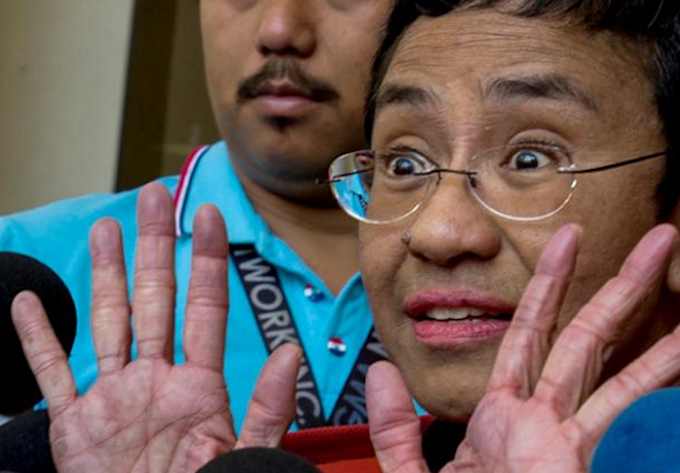
Reporters Without Borders (RSF) has condemned the up to six years in jail sentence that Philippine journalist Maria Ressa faces on a criminal libel charge in a “shocking judicial masquerade” in Manila yesterday.
It called on the country’s justice system to recover a “semblance of credibility” by overturning her conviction on appeal, RSF said in a statement as global media freedom and human rights watchdogs protested over the verdict.
A Manila regional court convicted Maria Ressa, co-founder and director of the independent news website Rappler, over an article published in 2012 that was the subject of a complaint by a businessman.
READ MORE: Maria Ressa found guilty in blow to Philippines’ press freedom
But the case was brought under a cyber crime law that took effect after the article’s publication. Rappler‘s former researcher-writer Reynaldo Santos Jr received the same sentence.
Both were allowed to post bail, pending an appeal.
As no criminal legislation can be retroactive, the National Bureau of Investigation dismissed the case in February 2018. But President Rodrigo Duterte’s Department of Justice decided otherwise.
‘Continuous publication’
It revived the case in February 2019 on the grounds that a supposed principle of “continuous publication” could be applied to websites.
“By passing this extremely harsh sentence at the end of utterly Kafkaesque proceedings, the Philippine justice system has demonstrated a complete lack of independence from the executive,” said Daniel Bastard, the head of RSF’s Asia-Pacific desk.
“This sentence bears the malevolent mark of President Duterte and his desire, by targeting Rappler and the figure of Maria Ressa, to eliminate all criticism whatever the cost.
“We urge Manila’s judges to restore a semblance of credibility to the Philippine judicial system by overturning this conviction on appeal.”
🇵🇭 @rapplerdotcom‘s @mariaressa could get six years in jail! By passing this harsh sentence after utterly Kafkaesque proceedings, the #Philippines‘ justice system has demonstrated a complete lack of independence from from pdt #Duterte‘s administration. https://t.co/RSK6RARyfM
— RSF (@RSF_inter) June 15, 2020
Systematic harassment
This conviction of Ressa and Rappler is the latest chapter in the systematic judicial harassment to which they have been subjected by various government agencies for more than two years.
Either directly or through Ressa, the website is facing 10 other similar complaints, each as baseless as the other, with the aim of intimidating its journalists.
“What with denying its reporters access to the presidential palace, threatening to withdraw its licence and accusing it of tax evasion, the authorities have stopped at nothing to harass Rappler, even arbitrarily detaining Ressa overnight in February 2019,” said Bastard.
ABS-CBN, the biggest Philippine broadcast network and one of the few other media outlets to dare criticise the government, had its franchise withdrawn last month.
Its radio stations and TV channels all stopped broadcasting on May 5 at the behest of the Justice Department and National Telecommunications Commission.
The country’s authoritarian president had warned the network’s executives last December: “If you expect that [the franchise] will be renewed, I’m sorry. I will see to it that you’re out.”
After falling seven places since 2017, the Philippines is ranked 136th out of 180 countries and territories in RSF’s 2020 World Press Freedom Index.
‘Damaging precedent’
In Brisbane, Professor Peter Greste, director and spokesperson of the Alliance for Journalists’ Freedom and UNESCO chair of journalism and communication at the University of Queensland, said the verdict set “an extraordinarily damaging precedent” for Asia-Pacific and global press freedom.
“To suggest there was no political pressure in this case would be incredibly naïve. The Philippine government has made it abundantly clear that they don’t think Maria should be free. The judge will have been acutely aware of this pressure.
“As a former political prisoner myself, I am deeply concerned about Maria and her former colleague, researcher-writer Reynaldo Santos Jr. who was also convicted in this case. More broadly though, I am concerned about what this means for the people of the Philippines.
“They might not all read Maria’s website, Rappler.com, but they all benefit from a free press that is able to question and challenge those in power. This judgment strikes a blow for every independent journalist in the country, chilling the kind of enquiry that makes democracy work.
“But this is not just about the Philippines. The human rights group, Freedom House, has charted a decline in democracy across the Asian region, and this conviction accelerates that trend.
“The AJF urges democratic governments – including Australia’s – to respond swiftly and decisively. This is a test case for the world’s resolve in standing up to authoritarianism by supporting press freedom.”
Maria Ressa found guilty in blow to Philippines’ press freedom #cyberlibel #mediafreedom @pacmedcentre @cnnphilippines @rapplerdotcom @mongster @dannyarao https://t.co/P6h8lNvEYr pic.twitter.com/FL75VyrdOy
— David Robie (@DavidRobie) June 15, 2020
‘Another nail in coffin’
In Auckland, Professor David Robie, director of the Pacific Media Centre, said the conviction of Rappler’s Maria Ressa and Raynaldo Santos Jr “drives another nail into the coffin of a free press and democracy” in the Philippines.
“It is also a chilling cautionary tale for the Asia-Pacific region and especially for those Pacific countries, such as Papua New Guinea and Fiji, that have imposed draconian cyber crime and social media laws that are really designed to stifle free expression and a free media.
“Fiji is currently deploying its social media law in a blatant attempt to muzzle its democratic opposition and intimidate the media. The behaviour of the state and security forces frequently display the typical characteristics of a virtual dictatorship.”
The Pacific Media Centre’s Pacific Media Watch freedom project collaborates with the Paris-based Reporters Without Borders.














































